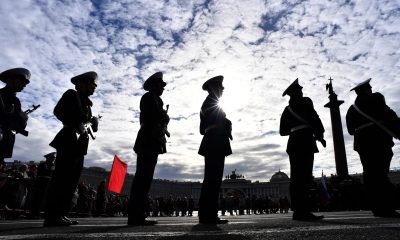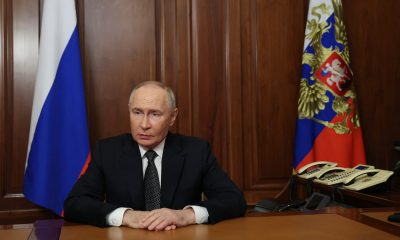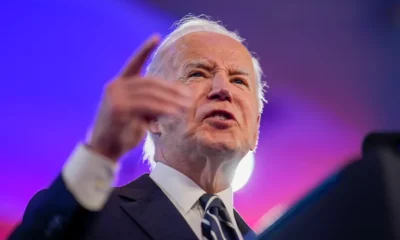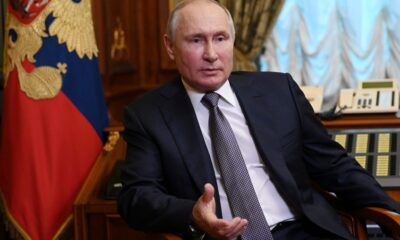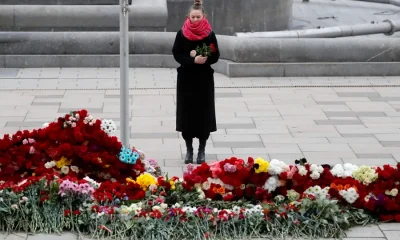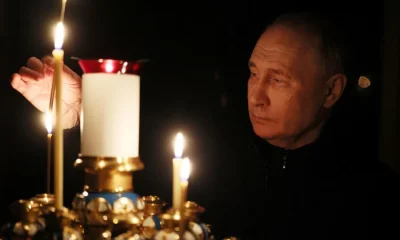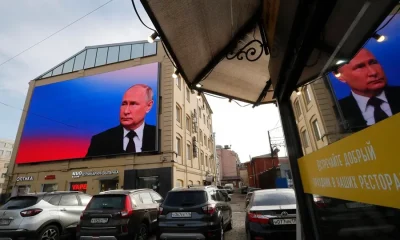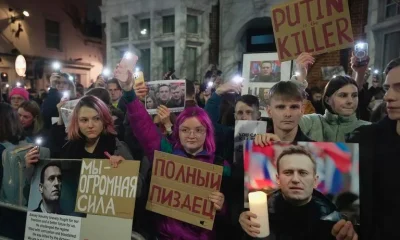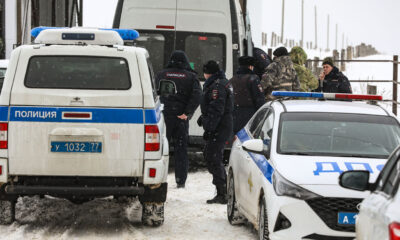International
Kim Jong-un and Vladimir Putin sign a “strategic association” agreement that includes a mutual defense clause
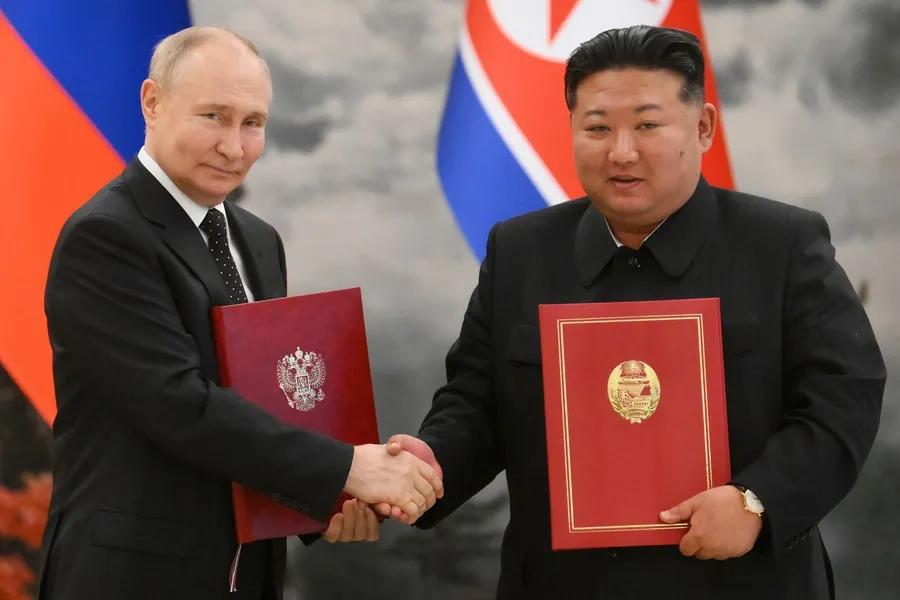
The leaders of North Korea and Russia, Kim Jong-un and Vladimir Putin, signed today Wednesday a “Comprehensique Strategic Partnership Agreement” that includes a mutual defense clause, according to the Russian president after his summit with North Korean leader Kim Jong-un.
The document signed between the two leaders contemplates “assistance in the event that one of the two countries is attacked,” Putin said in statements collected by the Russian agency Tass.
The Russian president also pointed out that “security issues and the international agenda” occupied a significant part of the agenda of the negotiations with the North Korean dictator.
The Kremlin president thus revealed part of the content of the new road map that will strub bilateral relations between the two countries, which have been strengthened as a result of the Russian invasion of Ukraine and in the face of pressure on Pyongyang and Moscow by Washington and its allies.
In this sense, Putin stated that both Russia and North Korea “oppose the use of sanctions for political purposes, which only serve to undermine the international situation.”
In addition, he called for “reviewing the United Nations Council’s sanctions regime on North Korea” promoted by the United States.
“Our countries consistently defend the establishment of a more just, democratic and multipolar world order. Russia and North Korea develop an autonomous and independent foreign policy and do not accept the language of blackmail and dictation,” the Russian president said.
“Despite external pressure, our countries develop successfully on a sovereign and independent basis, they have provided and provide mutual support as true friends and good neighbors,” he added.
Putin’s adviser on international policy, Yuri Ushakov, already said on the eve that this new treaty will replace those signed between Moscow and Pyongyang in 1961, 2000 and 2001.
Before that meeting, Putin and Kim Jong-un held an extended summit of about 90 minutes at the Kumsusan guest residence in Pyongyang, where Putin is visiting for the first time in 24 years.
It was in that scenario that the Russian president thanked the North Korean leader, Kim Jong-un, for his “unwavering support” to the invasion of Ukraine.
“Russia appreciates the constant and unshakable support of the Democratic People’s Republic of Korea (official name of North Korea) for Russian policies, including what concerns Ukraine,” Putin said.
He also said that Moscow “is fighting against decades of imperialist policies imposed by the United States,” and stressed that the relationship between Russia and North Korea “is based on mutual equality and respect,” according to the intervention collected by TASS.
In addition, Putin invited Kim to travel to Moscow for the next summit between the two countries, and expressed his “admiration” for the “transformation” experienced by the North Korean capital during the last 24 years.
“The government of the Democratic People’s Republic of Korea (official name of North Korea) values the important mission and the role of a strong Russian Federation in maintaining strategic stability and balance in the world,” said Kim, quoted by the RIA Nóvosti agency.
The North Korean leader also expressed “full support and solidarity with the Russian Government, army and people regarding the execution of the special military operation in Ukraine to protect their sovereignty, security interests and territorial integrity.”
Kim added that the global situation is changing rapidly and that in that context Pyongyang intends to strengthen its strategic ties with Moscow.
After the opening comments, the rest of the summit, which lasted a total of around 90 minutes, was held behind closed doors.
The meeting between the two leaders began after a welcome ceremony for the Russian president, Vladimir Putin, in the Kim Il-Sung Square of Pyongyang, the scene of the main parades and celebrations of the North Korean regime.
The RIA Nóvosti agency published a photo of the square full of people and decorated with balloons.
After the ceremony and the taking of photographs, both leaders went to the Kumsusan Guest Palace, where the Russian president is staying, to start their first meeting.
Today’s agenda also includes a gala concert in honor of Putin, a state reception and a floral offering by the Russian president at the Pyongyang Liberation Monument, dedicated to the Soviet Red Army soldiers who fought with Japanese imperial forces on the Korean peninsula during World War II.
Many analysts believe that Putin’s trip, which he plans to fly to Vietnam today for a two-day visit, can serve to deepen military ties after the agreement in this area that he and Kim signed at a summit last year in the Russian region of Amur.
International
Claudia Sheinbaum: Operation Against ‘El Mencho’ Was Based on Pending Arrest Warrants

Mexico’s President Claudia Sheinbaum on Wednesday rejected claims that the military operation that resulted in the death of Nemesio Oseguera Cervantes, known as “El Mencho,” leader of the Jalisco New Generation Cartel (CJNG), was carried out under pressure from the United States government.
Sheinbaum explained that the deployment of federal forces was aimed at executing outstanding arrest warrants against Oseguera Cervantes, who was considered one of the most wanted criminals in both Mexico and the United States.
“That was not the objective (to ease pressure from the United States). It is very important, and I want to repeat it. This individual had an arrest warrant, or several,” Sheinbaum said, referring to the operation conducted on February 22.
According to the president, the initial goal was to capture Oseguera Cervantes, but military forces responded after coming under attack during the intervention.
“The operation was to detain him. The problem is that they were attacked — the Secretariat of National Defense — and they responded at that moment,” she said.
The president insisted that the action was not carried out in response to external demands, although she acknowledged intelligence cooperation with the United States.
“It was not done in any way because of pressure from the United States, not at all. Of course, there was intelligence information from the United States that was used specifically,” she concluded.
International
Spain Denies Any Agreement to Cooperate with U.S. Military in Iran Operations
International
White House Says Spain Agrees to Cooperate with U.S. Military After Trump Threatens Trade Embargo

White House Press Secretary Karoline Leavitt said Wednesday that Spain has agreed “in recent hours” to cooperate with the U.S. military, following President Donald Trump’s threat to impose a trade embargo on Madrid.
Trump had warned of potential commercial measures after Spain reportedly refused to allow the Pentagon to use facilities at Spanish military bases for operations related to Iran.
“With respect to Spain, I think you heard the president’s message yesterday loud and clear, and I understand that in recent hours they have agreed to cooperate with the United States military,” Leavitt said during a press briefing.
She added that the U.S. military is currently coordinating with its counterparts in Spain. However, the president expects broader support.
“The president expects that all of Europe, all of our European allies, of course, will cooperate in this important mission — not only for the United States, but also for Europe,” Leavitt said.
Her remarks came in response to questions about Spain’s position and its role as a U.S. ally amid rising tensions surrounding operations involving Iran.
-

 International4 days ago
International4 days agoIran Reports 201 Dead, 747 Injured After U.S. and Israeli Strikes
-

 International3 days ago
International3 days agoBrazil’s Supreme Court Rejects Bolsonaro’s Bid for House Arrest
-

 International4 days ago
International4 days agoPope Leo XIV Urges End to ‘Spiral of Violence’ in Middle East
-

 International5 days ago
International5 days agoSecurity Council to Hold Emergency Meeting on Middle East Crisis
-

 International3 days ago
International3 days agoAnti-ICE Billboard Campaign Targets Immigration Spending in 31 U.S. Cities
-

 Sin categoría5 days ago
Sin categoría5 days agoTrump: ‘We Think It’s True’ Amid Claims Iran’s Supreme Leader Was Killed
-

 International2 days ago
International2 days agoSpain’s Prime Minister to Address Nation Amid Trump’s Trade Threats
-

 International3 days ago
International3 days agoTrump Warns of ‘Major Wave’ of Attacks as Iran Conflict Escalates
-

 International3 days ago
International3 days agoMexico Calls for Immediate Probe After National Dies in ICE Custody
-

 International16 hours ago
International16 hours agoWhite House Says Spain Agrees to Cooperate with U.S. Military After Trump Threatens Trade Embargo
-

 International3 days ago
International3 days agoBolivia Orders Three Investigations Into Deadly Military Plane Crash
-

 Central America16 hours ago
Central America16 hours agoNicaragua Held Responsible for Harassment of Opposition Prosecutor and His Family
-

 International16 hours ago
International16 hours agoSpain Denies Any Agreement to Cooperate with U.S. Military in Iran Operations
-

 International2 days ago
International2 days agoNew York Announces First 2,000 Seats in Universal 2-K Program
-

 Central America3 days ago
Central America3 days agoPanama Canal Monitoring Trade as Middle East Conflict Disrupts Shipping
-

 International2 days ago
International2 days agoWarner Bros. Developing First ‘Game of Thrones’ Movie With ‘Andor’ Writer
-

 Central America2 days ago
Central America2 days agoGuatemala’s Attorney General Fails in Bid for Top Court Seat Amid Corruption Allegations
-

 International16 hours ago
International16 hours agoClaudia Sheinbaum: Operation Against ‘El Mencho’ Was Based on Pending Arrest Warrants



























